Evidenced-Based Case Study: Mental Health Nursing of Jack, NPP6103
VerifiedAdded on 2023/04/10
|14
|3148
|399
Case Study
AI Summary
This case study examines the mental health of a 21-year-old man named Jack, who presents with symptoms of depression and suicidal ideation following the death of his father, academic struggles, and relationship issues. The study explores the prevalence of depression and suicide in Australia, highlighting the impact on communities and individuals. It delves into the reasons behind Jack's current condition, including family problems, academic failures, and relationship difficulties. The study also addresses ethical and legal considerations in healthcare, emphasizing beneficence, non-maleficence, and the Mental Health Act of Western Australia. High-priority health risks such as substance abuse and dementia are identified, along with nursing interventions including communication, psychotherapy, counseling, and medication. The paper underscores the importance of early intervention, ethical practice, and patient-centered care in managing mental health challenges. The case study aims to provide a comprehensive understanding of mental health nursing practice in the context of a real-life scenario, emphasizing the need for holistic care and support for individuals experiencing mental health crises.
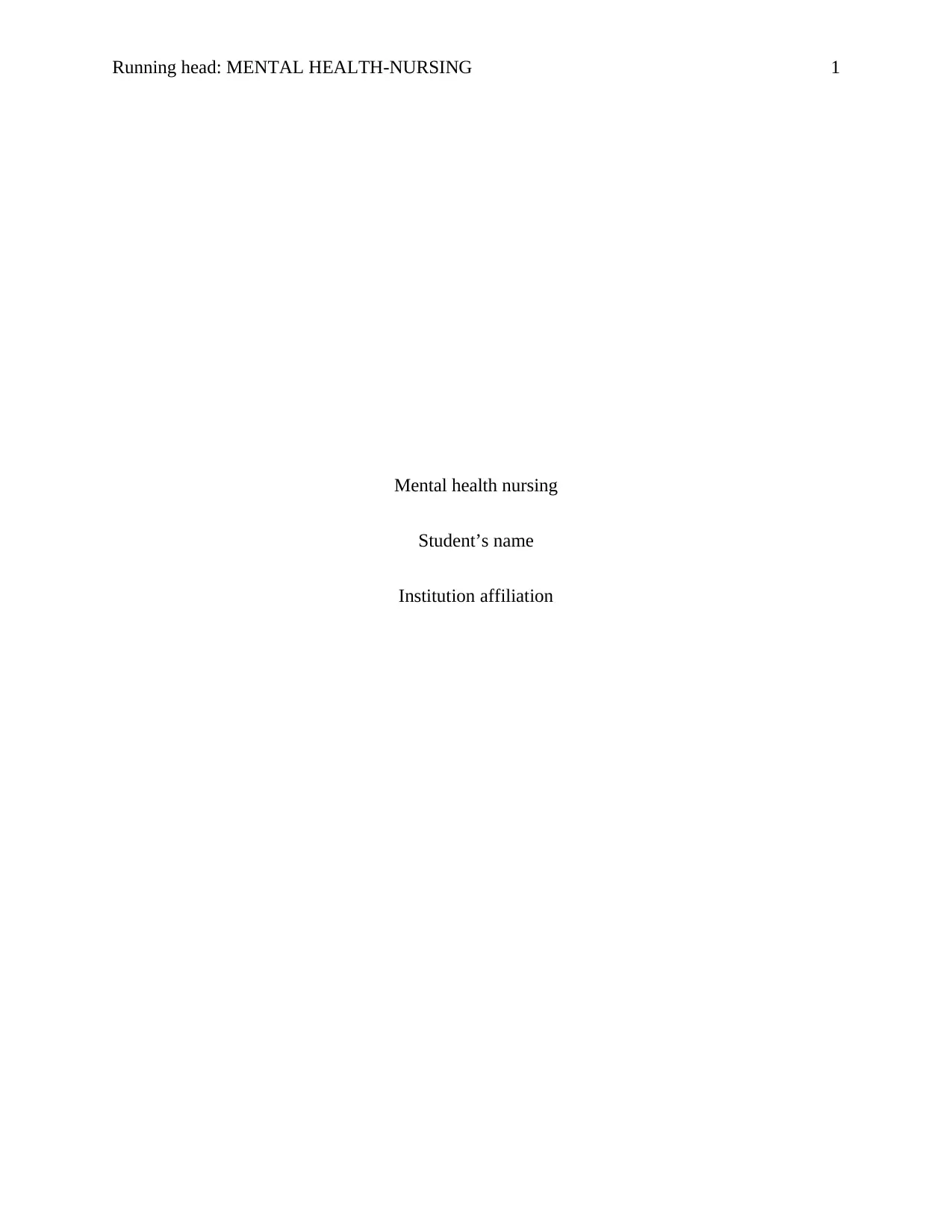
Running head: MENTAL HEALTH-NURSING 1
Mental health nursing
Student’s name
Institution affiliation
Mental health nursing
Student’s name
Institution affiliation
Paraphrase This Document
Need a fresh take? Get an instant paraphrase of this document with our AI Paraphraser
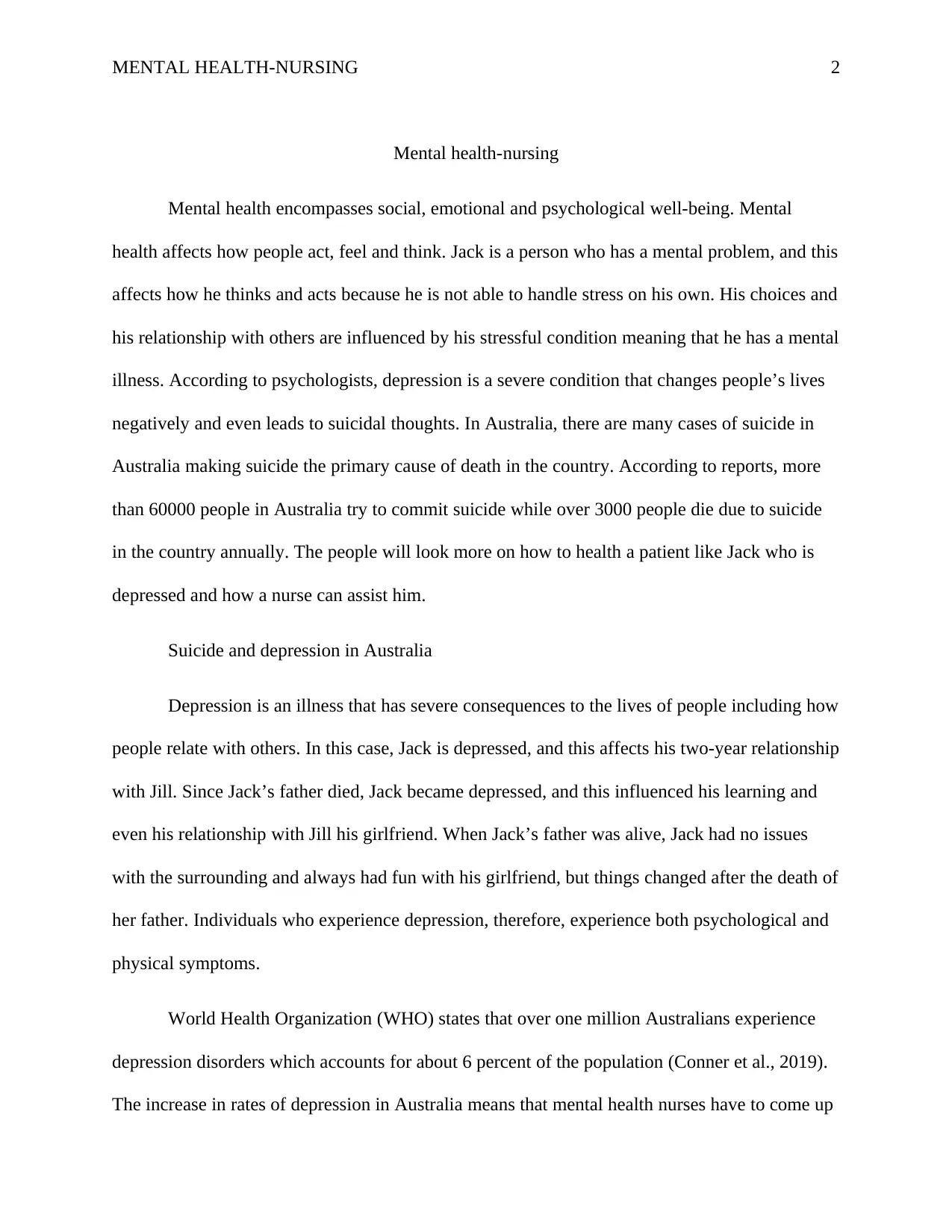
MENTAL HEALTH-NURSING 2
Mental health-nursing
Mental health encompasses social, emotional and psychological well-being. Mental
health affects how people act, feel and think. Jack is a person who has a mental problem, and this
affects how he thinks and acts because he is not able to handle stress on his own. His choices and
his relationship with others are influenced by his stressful condition meaning that he has a mental
illness. According to psychologists, depression is a severe condition that changes people’s lives
negatively and even leads to suicidal thoughts. In Australia, there are many cases of suicide in
Australia making suicide the primary cause of death in the country. According to reports, more
than 60000 people in Australia try to commit suicide while over 3000 people die due to suicide
in the country annually. The people will look more on how to health a patient like Jack who is
depressed and how a nurse can assist him.
Suicide and depression in Australia
Depression is an illness that has severe consequences to the lives of people including how
people relate with others. In this case, Jack is depressed, and this affects his two-year relationship
with Jill. Since Jack’s father died, Jack became depressed, and this influenced his learning and
even his relationship with Jill his girlfriend. When Jack’s father was alive, Jack had no issues
with the surrounding and always had fun with his girlfriend, but things changed after the death of
her father. Individuals who experience depression, therefore, experience both psychological and
physical symptoms.
World Health Organization (WHO) states that over one million Australians experience
depression disorders which accounts for about 6 percent of the population (Conner et al., 2019).
The increase in rates of depression in Australia means that mental health nurses have to come up
Mental health-nursing
Mental health encompasses social, emotional and psychological well-being. Mental
health affects how people act, feel and think. Jack is a person who has a mental problem, and this
affects how he thinks and acts because he is not able to handle stress on his own. His choices and
his relationship with others are influenced by his stressful condition meaning that he has a mental
illness. According to psychologists, depression is a severe condition that changes people’s lives
negatively and even leads to suicidal thoughts. In Australia, there are many cases of suicide in
Australia making suicide the primary cause of death in the country. According to reports, more
than 60000 people in Australia try to commit suicide while over 3000 people die due to suicide
in the country annually. The people will look more on how to health a patient like Jack who is
depressed and how a nurse can assist him.
Suicide and depression in Australia
Depression is an illness that has severe consequences to the lives of people including how
people relate with others. In this case, Jack is depressed, and this affects his two-year relationship
with Jill. Since Jack’s father died, Jack became depressed, and this influenced his learning and
even his relationship with Jill his girlfriend. When Jack’s father was alive, Jack had no issues
with the surrounding and always had fun with his girlfriend, but things changed after the death of
her father. Individuals who experience depression, therefore, experience both psychological and
physical symptoms.
World Health Organization (WHO) states that over one million Australians experience
depression disorders which accounts for about 6 percent of the population (Conner et al., 2019).
The increase in rates of depression in Australia means that mental health nurses have to come up
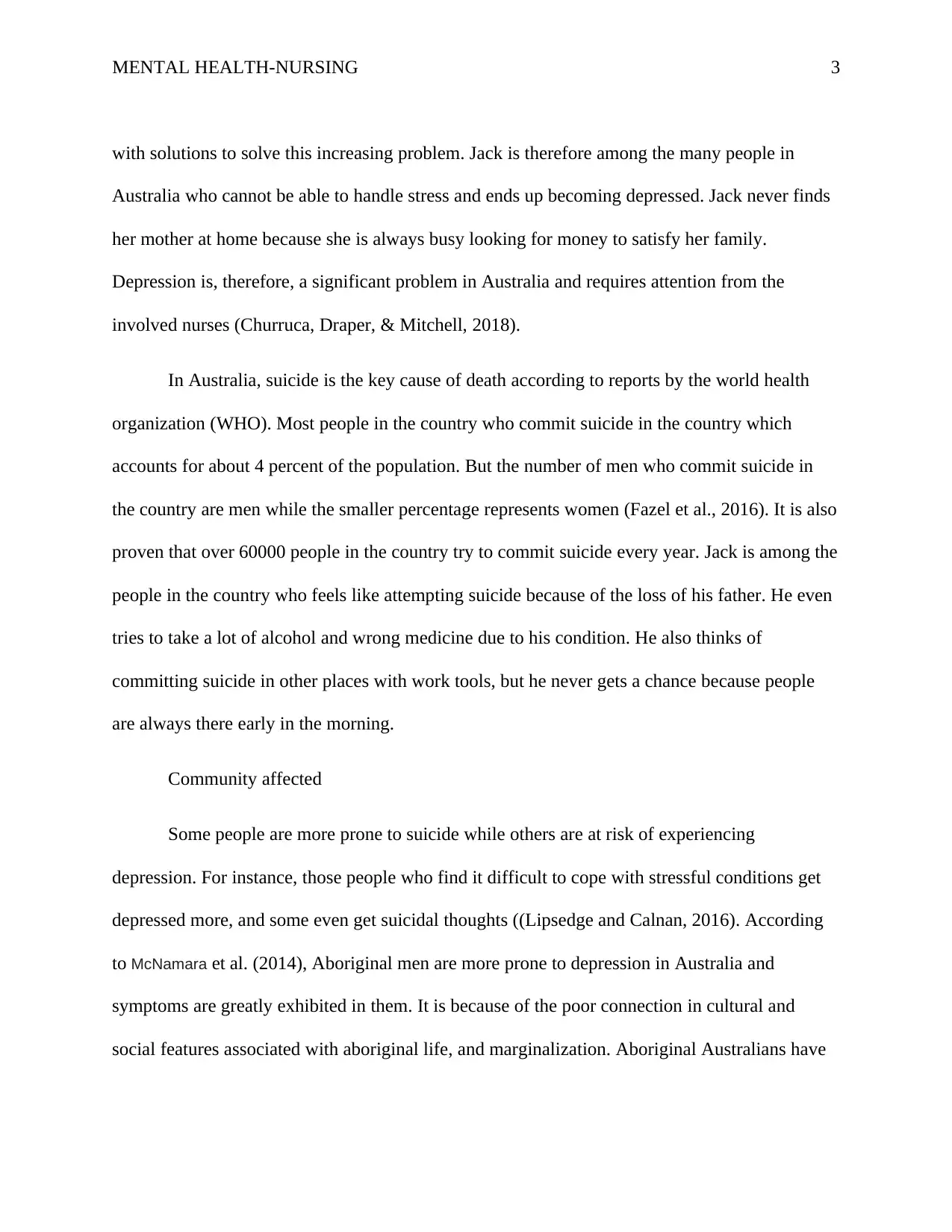
MENTAL HEALTH-NURSING 3
with solutions to solve this increasing problem. Jack is therefore among the many people in
Australia who cannot be able to handle stress and ends up becoming depressed. Jack never finds
her mother at home because she is always busy looking for money to satisfy her family.
Depression is, therefore, a significant problem in Australia and requires attention from the
involved nurses (Churruca, Draper, & Mitchell, 2018).
In Australia, suicide is the key cause of death according to reports by the world health
organization (WHO). Most people in the country who commit suicide in the country which
accounts for about 4 percent of the population. But the number of men who commit suicide in
the country are men while the smaller percentage represents women (Fazel et al., 2016). It is also
proven that over 60000 people in the country try to commit suicide every year. Jack is among the
people in the country who feels like attempting suicide because of the loss of his father. He even
tries to take a lot of alcohol and wrong medicine due to his condition. He also thinks of
committing suicide in other places with work tools, but he never gets a chance because people
are always there early in the morning.
Community affected
Some people are more prone to suicide while others are at risk of experiencing
depression. For instance, those people who find it difficult to cope with stressful conditions get
depressed more, and some even get suicidal thoughts ((Lipsedge and Calnan, 2016). According
to McNamara et al. (2014), Aboriginal men are more prone to depression in Australia and
symptoms are greatly exhibited in them. It is because of the poor connection in cultural and
social features associated with aboriginal life, and marginalization. Aboriginal Australians have
with solutions to solve this increasing problem. Jack is therefore among the many people in
Australia who cannot be able to handle stress and ends up becoming depressed. Jack never finds
her mother at home because she is always busy looking for money to satisfy her family.
Depression is, therefore, a significant problem in Australia and requires attention from the
involved nurses (Churruca, Draper, & Mitchell, 2018).
In Australia, suicide is the key cause of death according to reports by the world health
organization (WHO). Most people in the country who commit suicide in the country which
accounts for about 4 percent of the population. But the number of men who commit suicide in
the country are men while the smaller percentage represents women (Fazel et al., 2016). It is also
proven that over 60000 people in the country try to commit suicide every year. Jack is among the
people in the country who feels like attempting suicide because of the loss of his father. He even
tries to take a lot of alcohol and wrong medicine due to his condition. He also thinks of
committing suicide in other places with work tools, but he never gets a chance because people
are always there early in the morning.
Community affected
Some people are more prone to suicide while others are at risk of experiencing
depression. For instance, those people who find it difficult to cope with stressful conditions get
depressed more, and some even get suicidal thoughts ((Lipsedge and Calnan, 2016). According
to McNamara et al. (2014), Aboriginal men are more prone to depression in Australia and
symptoms are greatly exhibited in them. It is because of the poor connection in cultural and
social features associated with aboriginal life, and marginalization. Aboriginal Australians have
⊘ This is a preview!⊘
Do you want full access?
Subscribe today to unlock all pages.

Trusted by 1+ million students worldwide
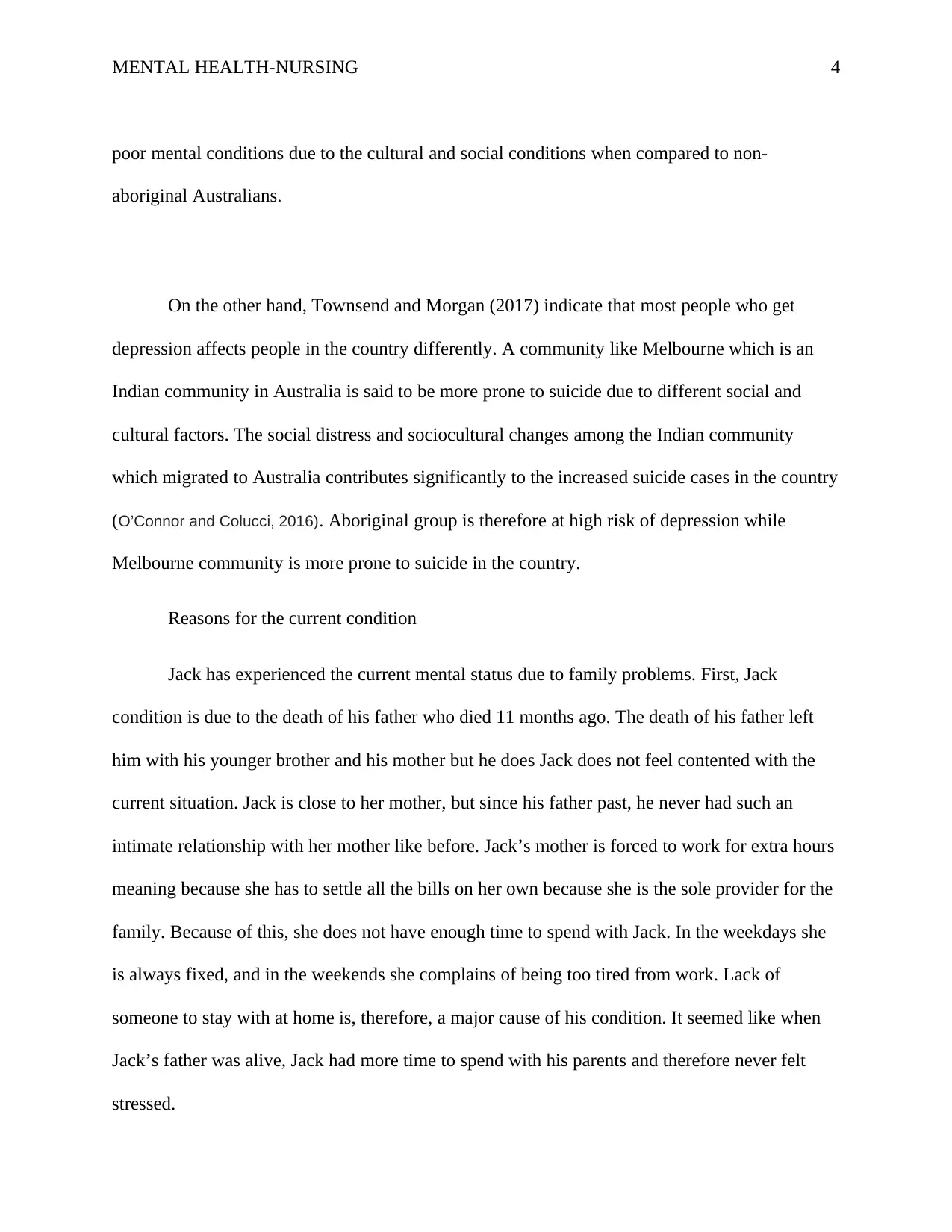
MENTAL HEALTH-NURSING 4
poor mental conditions due to the cultural and social conditions when compared to non-
aboriginal Australians.
On the other hand, Townsend and Morgan (2017) indicate that most people who get
depression affects people in the country differently. A community like Melbourne which is an
Indian community in Australia is said to be more prone to suicide due to different social and
cultural factors. The social distress and sociocultural changes among the Indian community
which migrated to Australia contributes significantly to the increased suicide cases in the country
(O’Connor and Colucci, 2016). Aboriginal group is therefore at high risk of depression while
Melbourne community is more prone to suicide in the country.
Reasons for the current condition
Jack has experienced the current mental status due to family problems. First, Jack
condition is due to the death of his father who died 11 months ago. The death of his father left
him with his younger brother and his mother but he does Jack does not feel contented with the
current situation. Jack is close to her mother, but since his father past, he never had such an
intimate relationship with her mother like before. Jack’s mother is forced to work for extra hours
meaning because she has to settle all the bills on her own because she is the sole provider for the
family. Because of this, she does not have enough time to spend with Jack. In the weekdays she
is always fixed, and in the weekends she complains of being too tired from work. Lack of
someone to stay with at home is, therefore, a major cause of his condition. It seemed like when
Jack’s father was alive, Jack had more time to spend with his parents and therefore never felt
stressed.
poor mental conditions due to the cultural and social conditions when compared to non-
aboriginal Australians.
On the other hand, Townsend and Morgan (2017) indicate that most people who get
depression affects people in the country differently. A community like Melbourne which is an
Indian community in Australia is said to be more prone to suicide due to different social and
cultural factors. The social distress and sociocultural changes among the Indian community
which migrated to Australia contributes significantly to the increased suicide cases in the country
(O’Connor and Colucci, 2016). Aboriginal group is therefore at high risk of depression while
Melbourne community is more prone to suicide in the country.
Reasons for the current condition
Jack has experienced the current mental status due to family problems. First, Jack
condition is due to the death of his father who died 11 months ago. The death of his father left
him with his younger brother and his mother but he does Jack does not feel contented with the
current situation. Jack is close to her mother, but since his father past, he never had such an
intimate relationship with her mother like before. Jack’s mother is forced to work for extra hours
meaning because she has to settle all the bills on her own because she is the sole provider for the
family. Because of this, she does not have enough time to spend with Jack. In the weekdays she
is always fixed, and in the weekends she complains of being too tired from work. Lack of
someone to stay with at home is, therefore, a major cause of his condition. It seemed like when
Jack’s father was alive, Jack had more time to spend with his parents and therefore never felt
stressed.
Paraphrase This Document
Need a fresh take? Get an instant paraphrase of this document with our AI Paraphraser
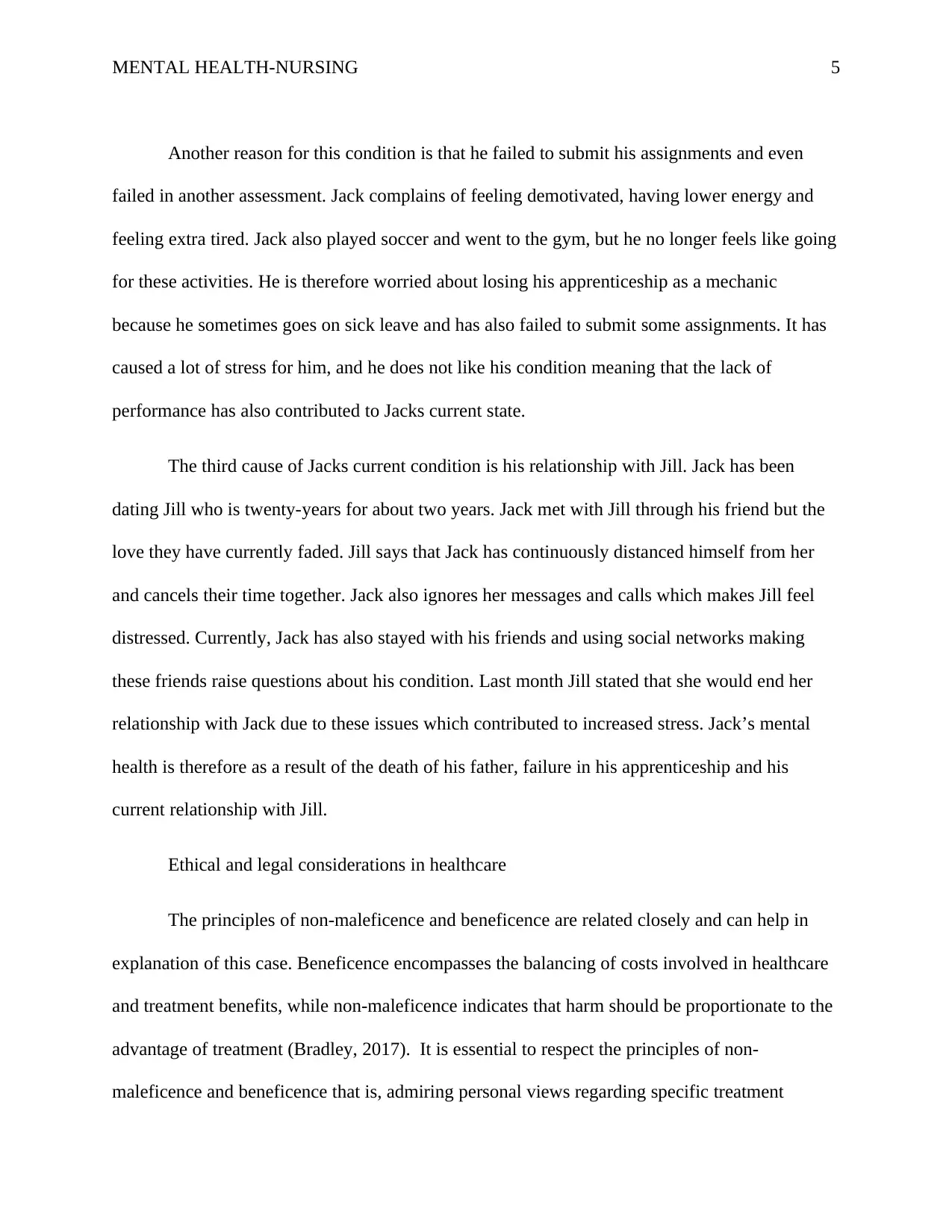
MENTAL HEALTH-NURSING 5
Another reason for this condition is that he failed to submit his assignments and even
failed in another assessment. Jack complains of feeling demotivated, having lower energy and
feeling extra tired. Jack also played soccer and went to the gym, but he no longer feels like going
for these activities. He is therefore worried about losing his apprenticeship as a mechanic
because he sometimes goes on sick leave and has also failed to submit some assignments. It has
caused a lot of stress for him, and he does not like his condition meaning that the lack of
performance has also contributed to Jacks current state.
The third cause of Jacks current condition is his relationship with Jill. Jack has been
dating Jill who is twenty-years for about two years. Jack met with Jill through his friend but the
love they have currently faded. Jill says that Jack has continuously distanced himself from her
and cancels their time together. Jack also ignores her messages and calls which makes Jill feel
distressed. Currently, Jack has also stayed with his friends and using social networks making
these friends raise questions about his condition. Last month Jill stated that she would end her
relationship with Jack due to these issues which contributed to increased stress. Jack’s mental
health is therefore as a result of the death of his father, failure in his apprenticeship and his
current relationship with Jill.
Ethical and legal considerations in healthcare
The principles of non-maleficence and beneficence are related closely and can help in
explanation of this case. Beneficence encompasses the balancing of costs involved in healthcare
and treatment benefits, while non-maleficence indicates that harm should be proportionate to the
advantage of treatment (Bradley, 2017). It is essential to respect the principles of non-
maleficence and beneficence that is, admiring personal views regarding specific treatment
Another reason for this condition is that he failed to submit his assignments and even
failed in another assessment. Jack complains of feeling demotivated, having lower energy and
feeling extra tired. Jack also played soccer and went to the gym, but he no longer feels like going
for these activities. He is therefore worried about losing his apprenticeship as a mechanic
because he sometimes goes on sick leave and has also failed to submit some assignments. It has
caused a lot of stress for him, and he does not like his condition meaning that the lack of
performance has also contributed to Jacks current state.
The third cause of Jacks current condition is his relationship with Jill. Jack has been
dating Jill who is twenty-years for about two years. Jack met with Jill through his friend but the
love they have currently faded. Jill says that Jack has continuously distanced himself from her
and cancels their time together. Jack also ignores her messages and calls which makes Jill feel
distressed. Currently, Jack has also stayed with his friends and using social networks making
these friends raise questions about his condition. Last month Jill stated that she would end her
relationship with Jack due to these issues which contributed to increased stress. Jack’s mental
health is therefore as a result of the death of his father, failure in his apprenticeship and his
current relationship with Jill.
Ethical and legal considerations in healthcare
The principles of non-maleficence and beneficence are related closely and can help in
explanation of this case. Beneficence encompasses the balancing of costs involved in healthcare
and treatment benefits, while non-maleficence indicates that harm should be proportionate to the
advantage of treatment (Bradley, 2017). It is essential to respect the principles of non-
maleficence and beneficence that is, admiring personal views regarding specific treatment
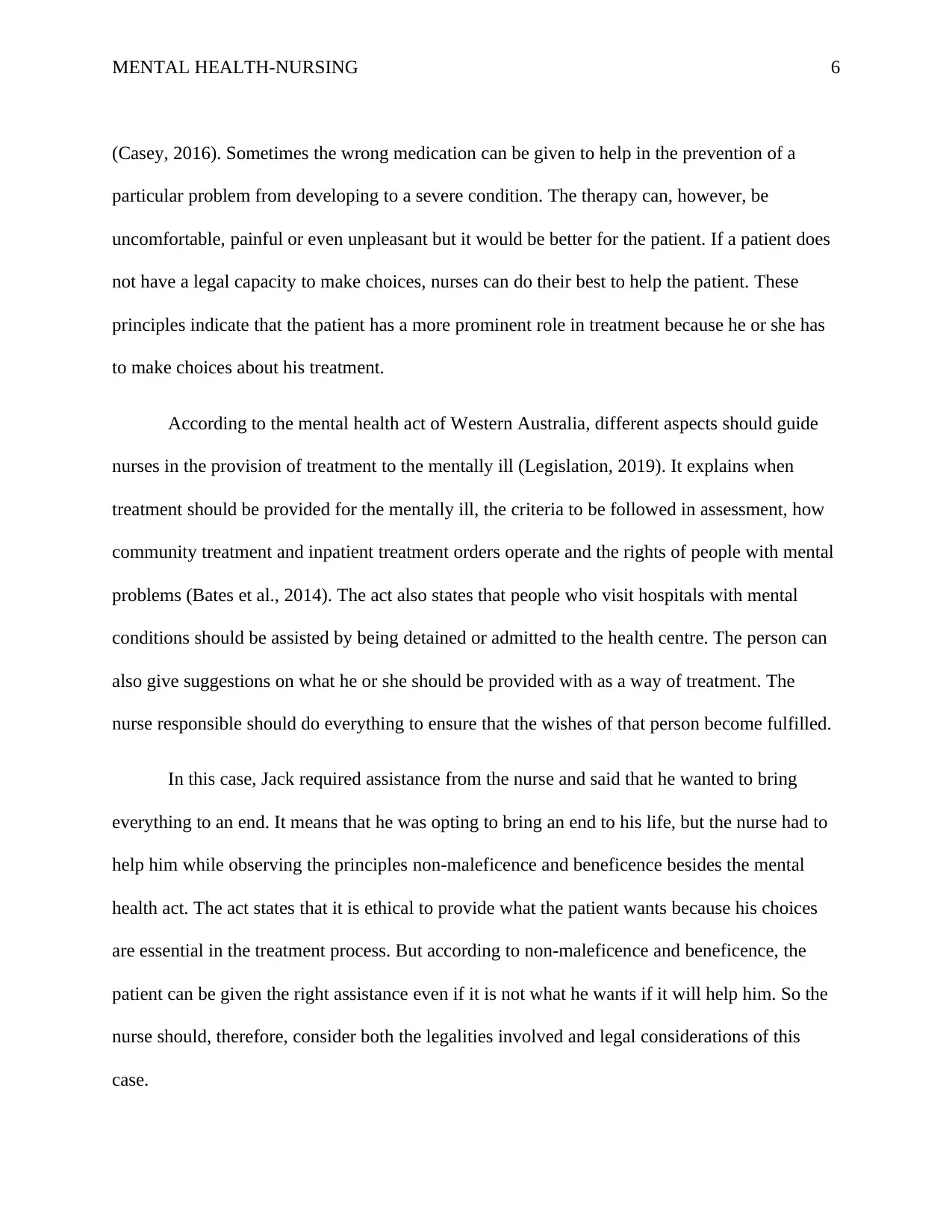
MENTAL HEALTH-NURSING 6
(Casey, 2016). Sometimes the wrong medication can be given to help in the prevention of a
particular problem from developing to a severe condition. The therapy can, however, be
uncomfortable, painful or even unpleasant but it would be better for the patient. If a patient does
not have a legal capacity to make choices, nurses can do their best to help the patient. These
principles indicate that the patient has a more prominent role in treatment because he or she has
to make choices about his treatment.
According to the mental health act of Western Australia, different aspects should guide
nurses in the provision of treatment to the mentally ill (Legislation, 2019). It explains when
treatment should be provided for the mentally ill, the criteria to be followed in assessment, how
community treatment and inpatient treatment orders operate and the rights of people with mental
problems (Bates et al., 2014). The act also states that people who visit hospitals with mental
conditions should be assisted by being detained or admitted to the health centre. The person can
also give suggestions on what he or she should be provided with as a way of treatment. The
nurse responsible should do everything to ensure that the wishes of that person become fulfilled.
In this case, Jack required assistance from the nurse and said that he wanted to bring
everything to an end. It means that he was opting to bring an end to his life, but the nurse had to
help him while observing the principles non-maleficence and beneficence besides the mental
health act. The act states that it is ethical to provide what the patient wants because his choices
are essential in the treatment process. But according to non-maleficence and beneficence, the
patient can be given the right assistance even if it is not what he wants if it will help him. So the
nurse should, therefore, consider both the legalities involved and legal considerations of this
case.
(Casey, 2016). Sometimes the wrong medication can be given to help in the prevention of a
particular problem from developing to a severe condition. The therapy can, however, be
uncomfortable, painful or even unpleasant but it would be better for the patient. If a patient does
not have a legal capacity to make choices, nurses can do their best to help the patient. These
principles indicate that the patient has a more prominent role in treatment because he or she has
to make choices about his treatment.
According to the mental health act of Western Australia, different aspects should guide
nurses in the provision of treatment to the mentally ill (Legislation, 2019). It explains when
treatment should be provided for the mentally ill, the criteria to be followed in assessment, how
community treatment and inpatient treatment orders operate and the rights of people with mental
problems (Bates et al., 2014). The act also states that people who visit hospitals with mental
conditions should be assisted by being detained or admitted to the health centre. The person can
also give suggestions on what he or she should be provided with as a way of treatment. The
nurse responsible should do everything to ensure that the wishes of that person become fulfilled.
In this case, Jack required assistance from the nurse and said that he wanted to bring
everything to an end. It means that he was opting to bring an end to his life, but the nurse had to
help him while observing the principles non-maleficence and beneficence besides the mental
health act. The act states that it is ethical to provide what the patient wants because his choices
are essential in the treatment process. But according to non-maleficence and beneficence, the
patient can be given the right assistance even if it is not what he wants if it will help him. So the
nurse should, therefore, consider both the legalities involved and legal considerations of this
case.
⊘ This is a preview!⊘
Do you want full access?
Subscribe today to unlock all pages.

Trusted by 1+ million students worldwide
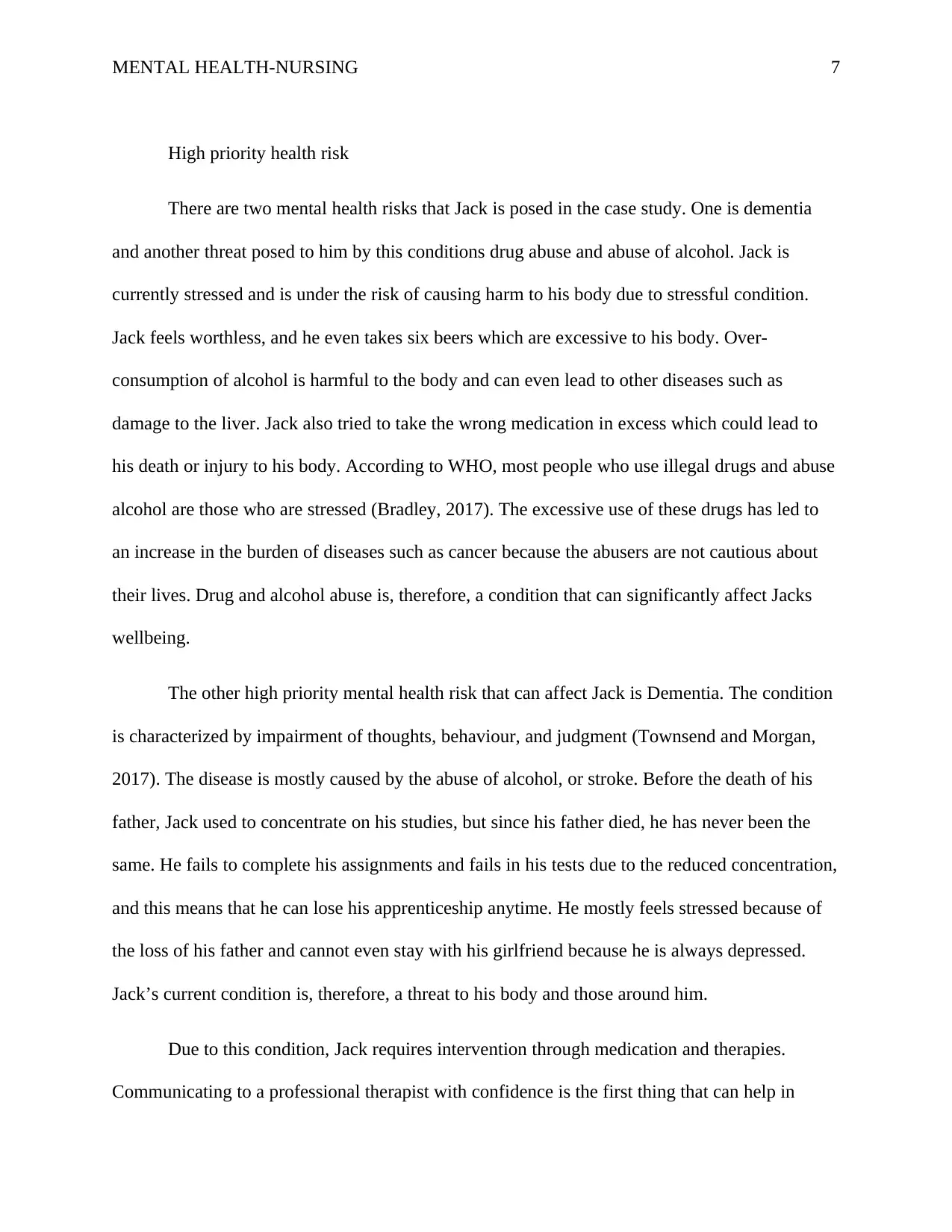
MENTAL HEALTH-NURSING 7
High priority health risk
There are two mental health risks that Jack is posed in the case study. One is dementia
and another threat posed to him by this conditions drug abuse and abuse of alcohol. Jack is
currently stressed and is under the risk of causing harm to his body due to stressful condition.
Jack feels worthless, and he even takes six beers which are excessive to his body. Over-
consumption of alcohol is harmful to the body and can even lead to other diseases such as
damage to the liver. Jack also tried to take the wrong medication in excess which could lead to
his death or injury to his body. According to WHO, most people who use illegal drugs and abuse
alcohol are those who are stressed (Bradley, 2017). The excessive use of these drugs has led to
an increase in the burden of diseases such as cancer because the abusers are not cautious about
their lives. Drug and alcohol abuse is, therefore, a condition that can significantly affect Jacks
wellbeing.
The other high priority mental health risk that can affect Jack is Dementia. The condition
is characterized by impairment of thoughts, behaviour, and judgment (Townsend and Morgan,
2017). The disease is mostly caused by the abuse of alcohol, or stroke. Before the death of his
father, Jack used to concentrate on his studies, but since his father died, he has never been the
same. He fails to complete his assignments and fails in his tests due to the reduced concentration,
and this means that he can lose his apprenticeship anytime. He mostly feels stressed because of
the loss of his father and cannot even stay with his girlfriend because he is always depressed.
Jack’s current condition is, therefore, a threat to his body and those around him.
Due to this condition, Jack requires intervention through medication and therapies.
Communicating to a professional therapist with confidence is the first thing that can help in
High priority health risk
There are two mental health risks that Jack is posed in the case study. One is dementia
and another threat posed to him by this conditions drug abuse and abuse of alcohol. Jack is
currently stressed and is under the risk of causing harm to his body due to stressful condition.
Jack feels worthless, and he even takes six beers which are excessive to his body. Over-
consumption of alcohol is harmful to the body and can even lead to other diseases such as
damage to the liver. Jack also tried to take the wrong medication in excess which could lead to
his death or injury to his body. According to WHO, most people who use illegal drugs and abuse
alcohol are those who are stressed (Bradley, 2017). The excessive use of these drugs has led to
an increase in the burden of diseases such as cancer because the abusers are not cautious about
their lives. Drug and alcohol abuse is, therefore, a condition that can significantly affect Jacks
wellbeing.
The other high priority mental health risk that can affect Jack is Dementia. The condition
is characterized by impairment of thoughts, behaviour, and judgment (Townsend and Morgan,
2017). The disease is mostly caused by the abuse of alcohol, or stroke. Before the death of his
father, Jack used to concentrate on his studies, but since his father died, he has never been the
same. He fails to complete his assignments and fails in his tests due to the reduced concentration,
and this means that he can lose his apprenticeship anytime. He mostly feels stressed because of
the loss of his father and cannot even stay with his girlfriend because he is always depressed.
Jack’s current condition is, therefore, a threat to his body and those around him.
Due to this condition, Jack requires intervention through medication and therapies.
Communicating to a professional therapist with confidence is the first thing that can help in
Paraphrase This Document
Need a fresh take? Get an instant paraphrase of this document with our AI Paraphraser
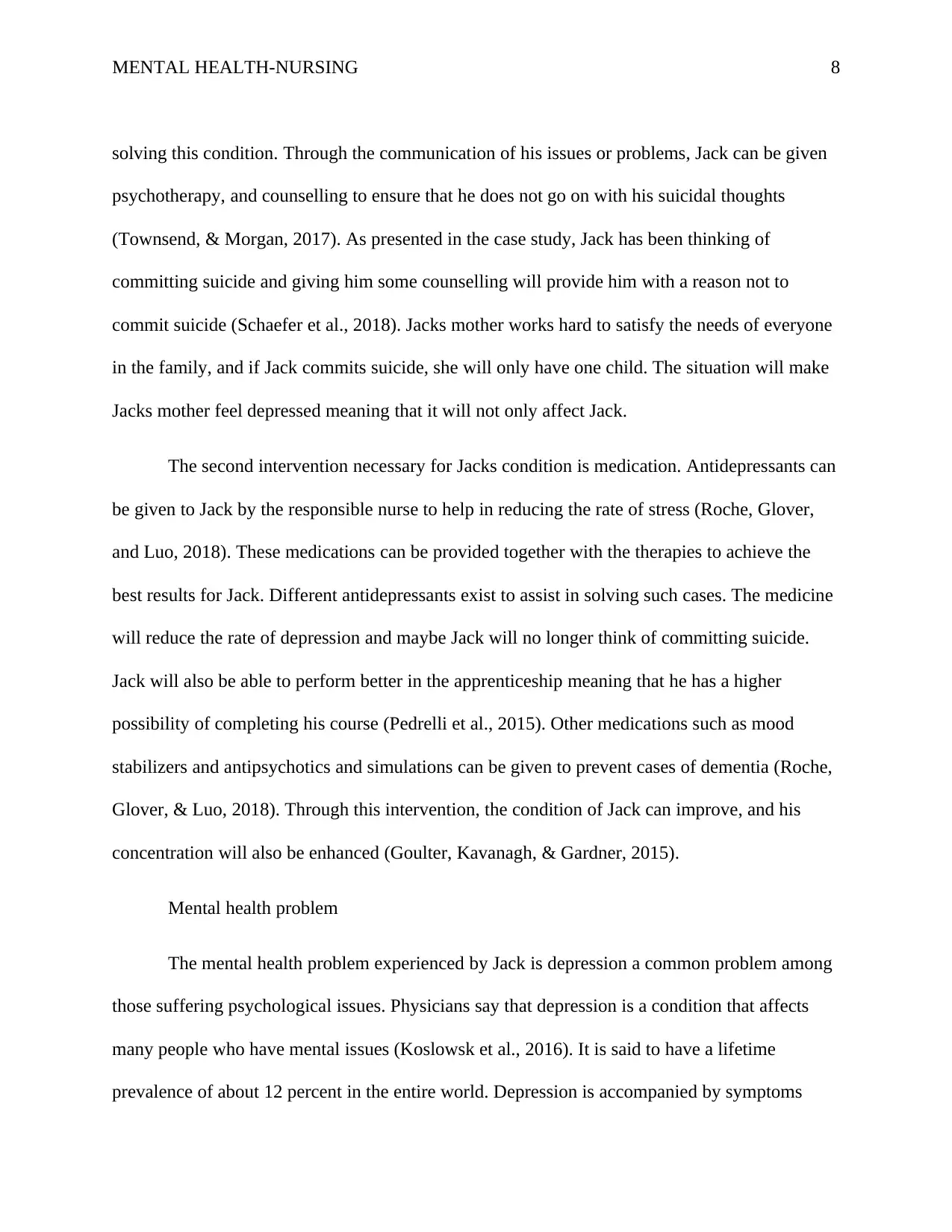
MENTAL HEALTH-NURSING 8
solving this condition. Through the communication of his issues or problems, Jack can be given
psychotherapy, and counselling to ensure that he does not go on with his suicidal thoughts
(Townsend, & Morgan, 2017). As presented in the case study, Jack has been thinking of
committing suicide and giving him some counselling will provide him with a reason not to
commit suicide (Schaefer et al., 2018). Jacks mother works hard to satisfy the needs of everyone
in the family, and if Jack commits suicide, she will only have one child. The situation will make
Jacks mother feel depressed meaning that it will not only affect Jack.
The second intervention necessary for Jacks condition is medication. Antidepressants can
be given to Jack by the responsible nurse to help in reducing the rate of stress (Roche, Glover,
and Luo, 2018). These medications can be provided together with the therapies to achieve the
best results for Jack. Different antidepressants exist to assist in solving such cases. The medicine
will reduce the rate of depression and maybe Jack will no longer think of committing suicide.
Jack will also be able to perform better in the apprenticeship meaning that he has a higher
possibility of completing his course (Pedrelli et al., 2015). Other medications such as mood
stabilizers and antipsychotics and simulations can be given to prevent cases of dementia (Roche,
Glover, & Luo, 2018). Through this intervention, the condition of Jack can improve, and his
concentration will also be enhanced (Goulter, Kavanagh, & Gardner, 2015).
Mental health problem
The mental health problem experienced by Jack is depression a common problem among
those suffering psychological issues. Physicians say that depression is a condition that affects
many people who have mental issues (Koslowsk et al., 2016). It is said to have a lifetime
prevalence of about 12 percent in the entire world. Depression is accompanied by symptoms
solving this condition. Through the communication of his issues or problems, Jack can be given
psychotherapy, and counselling to ensure that he does not go on with his suicidal thoughts
(Townsend, & Morgan, 2017). As presented in the case study, Jack has been thinking of
committing suicide and giving him some counselling will provide him with a reason not to
commit suicide (Schaefer et al., 2018). Jacks mother works hard to satisfy the needs of everyone
in the family, and if Jack commits suicide, she will only have one child. The situation will make
Jacks mother feel depressed meaning that it will not only affect Jack.
The second intervention necessary for Jacks condition is medication. Antidepressants can
be given to Jack by the responsible nurse to help in reducing the rate of stress (Roche, Glover,
and Luo, 2018). These medications can be provided together with the therapies to achieve the
best results for Jack. Different antidepressants exist to assist in solving such cases. The medicine
will reduce the rate of depression and maybe Jack will no longer think of committing suicide.
Jack will also be able to perform better in the apprenticeship meaning that he has a higher
possibility of completing his course (Pedrelli et al., 2015). Other medications such as mood
stabilizers and antipsychotics and simulations can be given to prevent cases of dementia (Roche,
Glover, & Luo, 2018). Through this intervention, the condition of Jack can improve, and his
concentration will also be enhanced (Goulter, Kavanagh, & Gardner, 2015).
Mental health problem
The mental health problem experienced by Jack is depression a common problem among
those suffering psychological issues. Physicians say that depression is a condition that affects
many people who have mental issues (Koslowsk et al., 2016). It is said to have a lifetime
prevalence of about 12 percent in the entire world. Depression is accompanied by symptoms
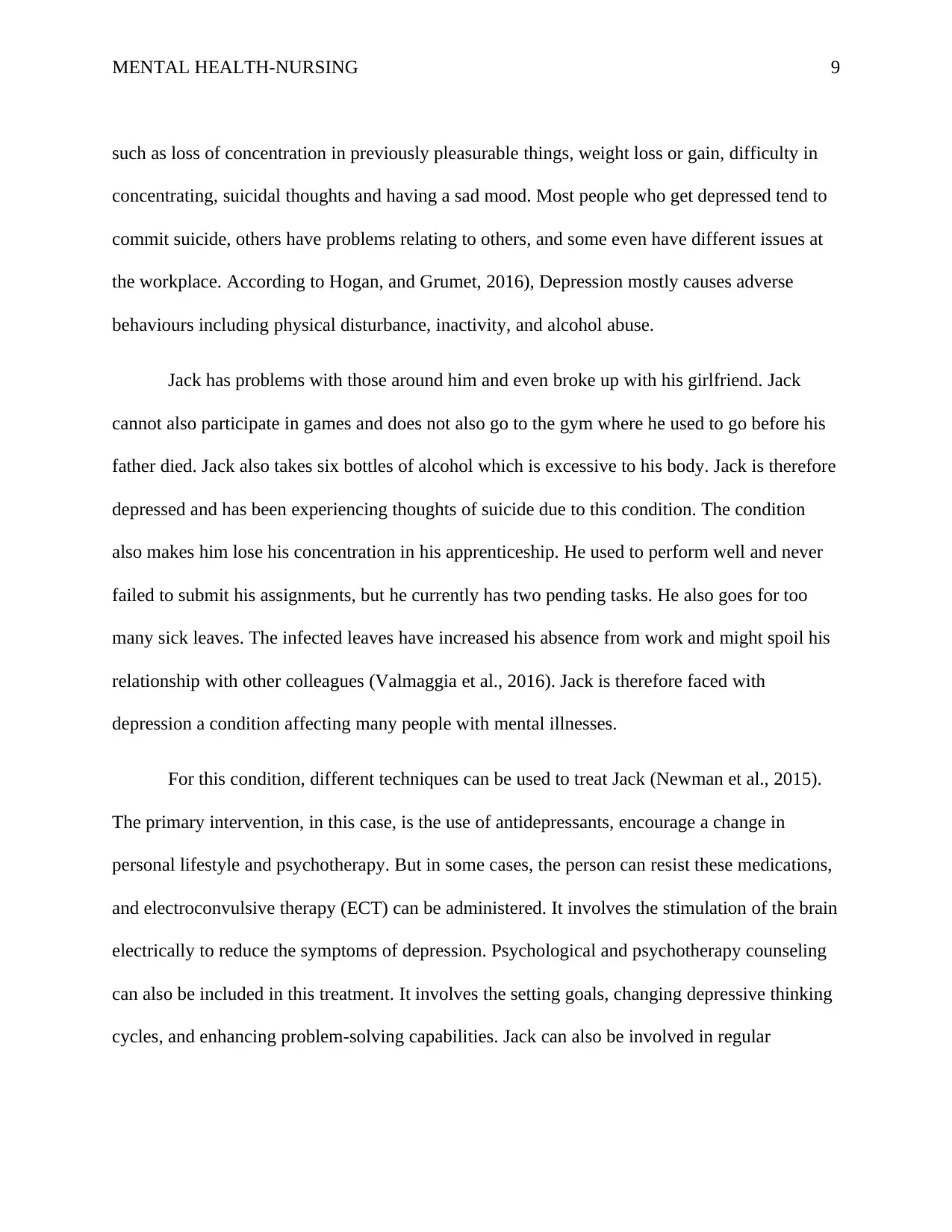
MENTAL HEALTH-NURSING 9
such as loss of concentration in previously pleasurable things, weight loss or gain, difficulty in
concentrating, suicidal thoughts and having a sad mood. Most people who get depressed tend to
commit suicide, others have problems relating to others, and some even have different issues at
the workplace. According to Hogan, and Grumet, 2016), Depression mostly causes adverse
behaviours including physical disturbance, inactivity, and alcohol abuse.
Jack has problems with those around him and even broke up with his girlfriend. Jack
cannot also participate in games and does not also go to the gym where he used to go before his
father died. Jack also takes six bottles of alcohol which is excessive to his body. Jack is therefore
depressed and has been experiencing thoughts of suicide due to this condition. The condition
also makes him lose his concentration in his apprenticeship. He used to perform well and never
failed to submit his assignments, but he currently has two pending tasks. He also goes for too
many sick leaves. The infected leaves have increased his absence from work and might spoil his
relationship with other colleagues (Valmaggia et al., 2016). Jack is therefore faced with
depression a condition affecting many people with mental illnesses.
For this condition, different techniques can be used to treat Jack (Newman et al., 2015).
The primary intervention, in this case, is the use of antidepressants, encourage a change in
personal lifestyle and psychotherapy. But in some cases, the person can resist these medications,
and electroconvulsive therapy (ECT) can be administered. It involves the stimulation of the brain
electrically to reduce the symptoms of depression. Psychological and psychotherapy counseling
can also be included in this treatment. It involves the setting goals, changing depressive thinking
cycles, and enhancing problem-solving capabilities. Jack can also be involved in regular
such as loss of concentration in previously pleasurable things, weight loss or gain, difficulty in
concentrating, suicidal thoughts and having a sad mood. Most people who get depressed tend to
commit suicide, others have problems relating to others, and some even have different issues at
the workplace. According to Hogan, and Grumet, 2016), Depression mostly causes adverse
behaviours including physical disturbance, inactivity, and alcohol abuse.
Jack has problems with those around him and even broke up with his girlfriend. Jack
cannot also participate in games and does not also go to the gym where he used to go before his
father died. Jack also takes six bottles of alcohol which is excessive to his body. Jack is therefore
depressed and has been experiencing thoughts of suicide due to this condition. The condition
also makes him lose his concentration in his apprenticeship. He used to perform well and never
failed to submit his assignments, but he currently has two pending tasks. He also goes for too
many sick leaves. The infected leaves have increased his absence from work and might spoil his
relationship with other colleagues (Valmaggia et al., 2016). Jack is therefore faced with
depression a condition affecting many people with mental illnesses.
For this condition, different techniques can be used to treat Jack (Newman et al., 2015).
The primary intervention, in this case, is the use of antidepressants, encourage a change in
personal lifestyle and psychotherapy. But in some cases, the person can resist these medications,
and electroconvulsive therapy (ECT) can be administered. It involves the stimulation of the brain
electrically to reduce the symptoms of depression. Psychological and psychotherapy counseling
can also be included in this treatment. It involves the setting goals, changing depressive thinking
cycles, and enhancing problem-solving capabilities. Jack can also be involved in regular
⊘ This is a preview!⊘
Do you want full access?
Subscribe today to unlock all pages.

Trusted by 1+ million students worldwide
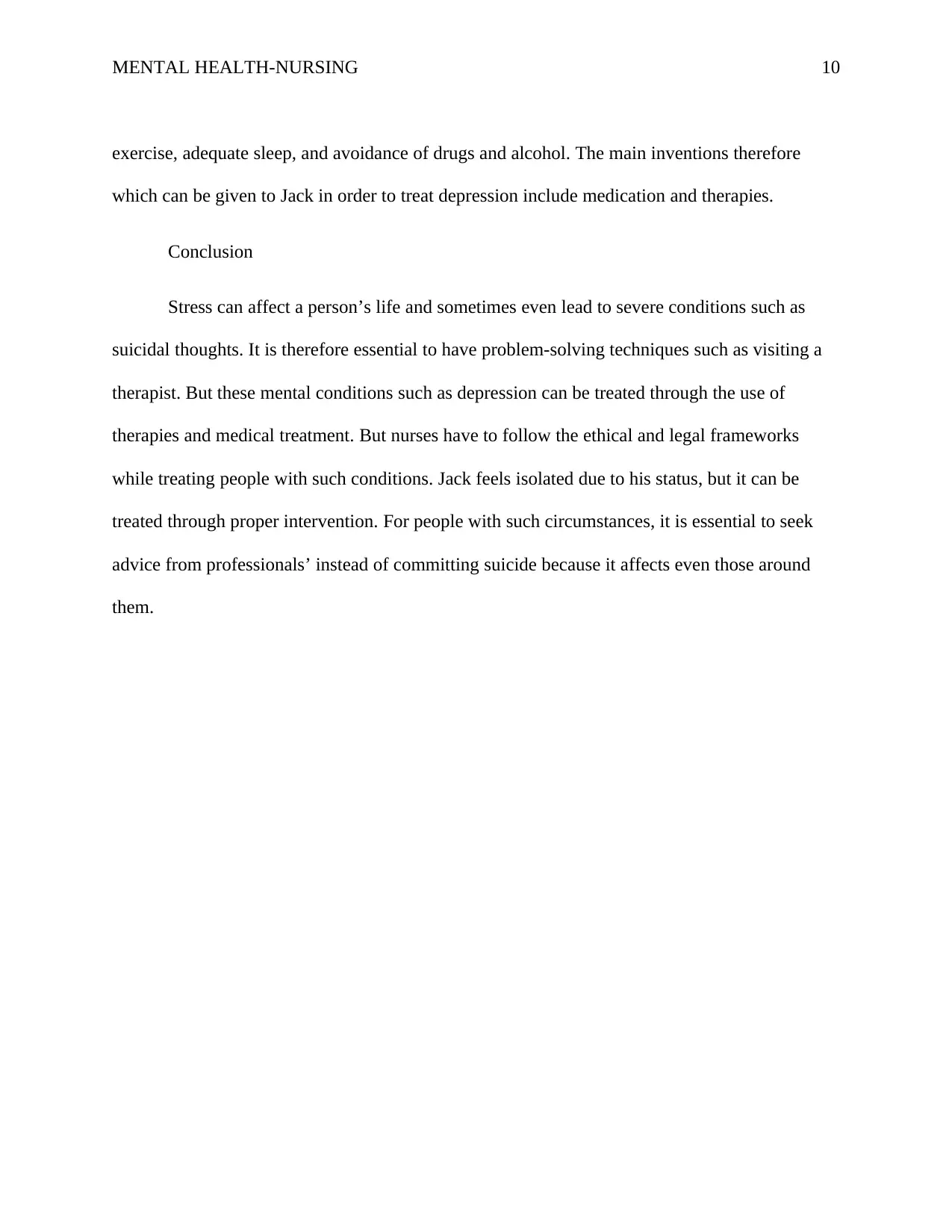
MENTAL HEALTH-NURSING 10
exercise, adequate sleep, and avoidance of drugs and alcohol. The main inventions therefore
which can be given to Jack in order to treat depression include medication and therapies.
Conclusion
Stress can affect a person’s life and sometimes even lead to severe conditions such as
suicidal thoughts. It is therefore essential to have problem-solving techniques such as visiting a
therapist. But these mental conditions such as depression can be treated through the use of
therapies and medical treatment. But nurses have to follow the ethical and legal frameworks
while treating people with such conditions. Jack feels isolated due to his status, but it can be
treated through proper intervention. For people with such circumstances, it is essential to seek
advice from professionals’ instead of committing suicide because it affects even those around
them.
exercise, adequate sleep, and avoidance of drugs and alcohol. The main inventions therefore
which can be given to Jack in order to treat depression include medication and therapies.
Conclusion
Stress can affect a person’s life and sometimes even lead to severe conditions such as
suicidal thoughts. It is therefore essential to have problem-solving techniques such as visiting a
therapist. But these mental conditions such as depression can be treated through the use of
therapies and medical treatment. But nurses have to follow the ethical and legal frameworks
while treating people with such conditions. Jack feels isolated due to his status, but it can be
treated through proper intervention. For people with such circumstances, it is essential to seek
advice from professionals’ instead of committing suicide because it affects even those around
them.
Paraphrase This Document
Need a fresh take? Get an instant paraphrase of this document with our AI Paraphraser
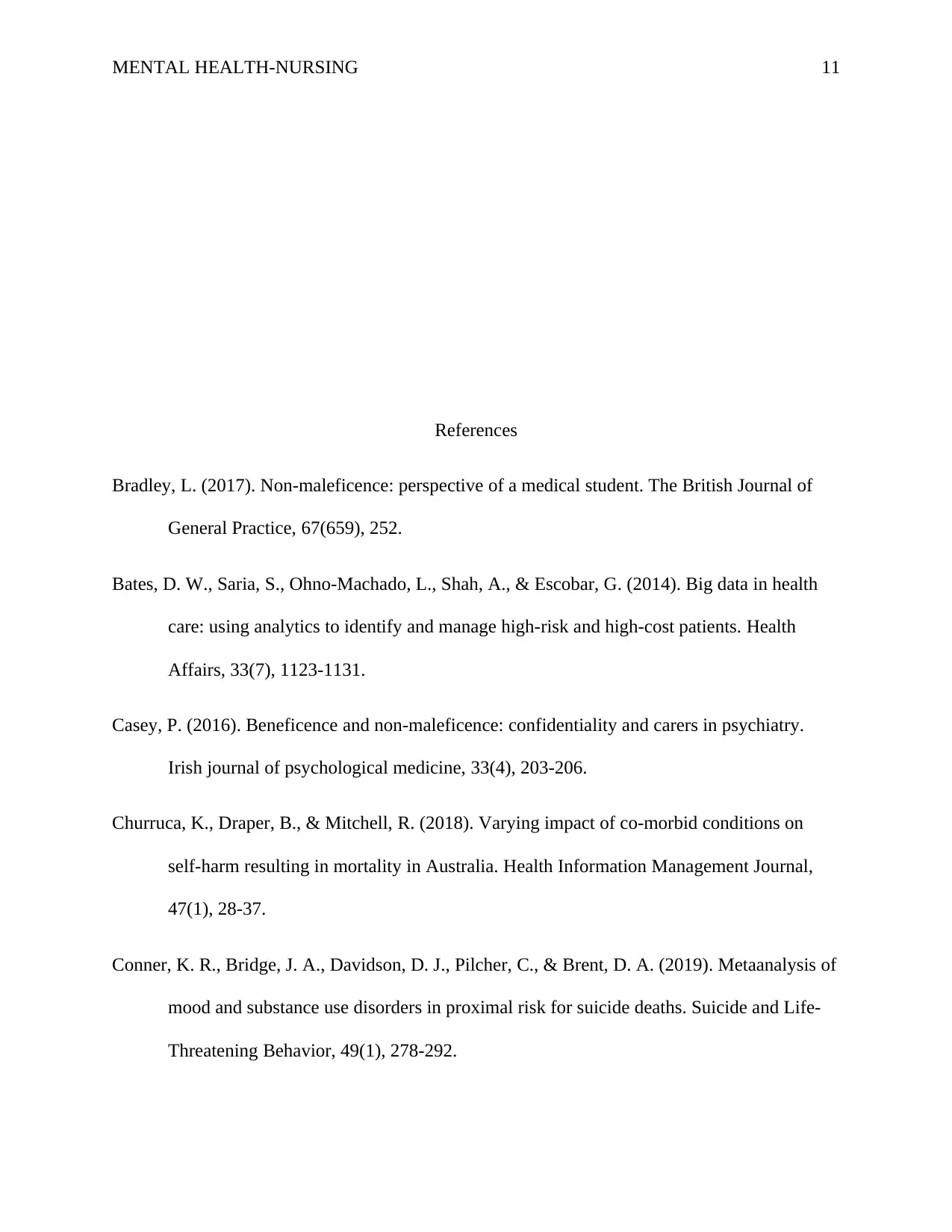
MENTAL HEALTH-NURSING 11
References
Bradley, L. (2017). Non-maleficence: perspective of a medical student. The British Journal of
General Practice, 67(659), 252.
Bates, D. W., Saria, S., Ohno-Machado, L., Shah, A., & Escobar, G. (2014). Big data in health
care: using analytics to identify and manage high-risk and high-cost patients. Health
Affairs, 33(7), 1123-1131.
Casey, P. (2016). Beneficence and non-maleficence: confidentiality and carers in psychiatry.
Irish journal of psychological medicine, 33(4), 203-206.
Churruca, K., Draper, B., & Mitchell, R. (2018). Varying impact of co-morbid conditions on
self-harm resulting in mortality in Australia. Health Information Management Journal,
47(1), 28-37.
Conner, K. R., Bridge, J. A., Davidson, D. J., Pilcher, C., & Brent, D. A. (2019). Metaanalysis of
mood and substance use disorders in proximal risk for suicide deaths. Suicide and Life‐
Threatening Behavior, 49(1), 278-292.
References
Bradley, L. (2017). Non-maleficence: perspective of a medical student. The British Journal of
General Practice, 67(659), 252.
Bates, D. W., Saria, S., Ohno-Machado, L., Shah, A., & Escobar, G. (2014). Big data in health
care: using analytics to identify and manage high-risk and high-cost patients. Health
Affairs, 33(7), 1123-1131.
Casey, P. (2016). Beneficence and non-maleficence: confidentiality and carers in psychiatry.
Irish journal of psychological medicine, 33(4), 203-206.
Churruca, K., Draper, B., & Mitchell, R. (2018). Varying impact of co-morbid conditions on
self-harm resulting in mortality in Australia. Health Information Management Journal,
47(1), 28-37.
Conner, K. R., Bridge, J. A., Davidson, D. J., Pilcher, C., & Brent, D. A. (2019). Metaanalysis of
mood and substance use disorders in proximal risk for suicide deaths. Suicide and Life‐
Threatening Behavior, 49(1), 278-292.
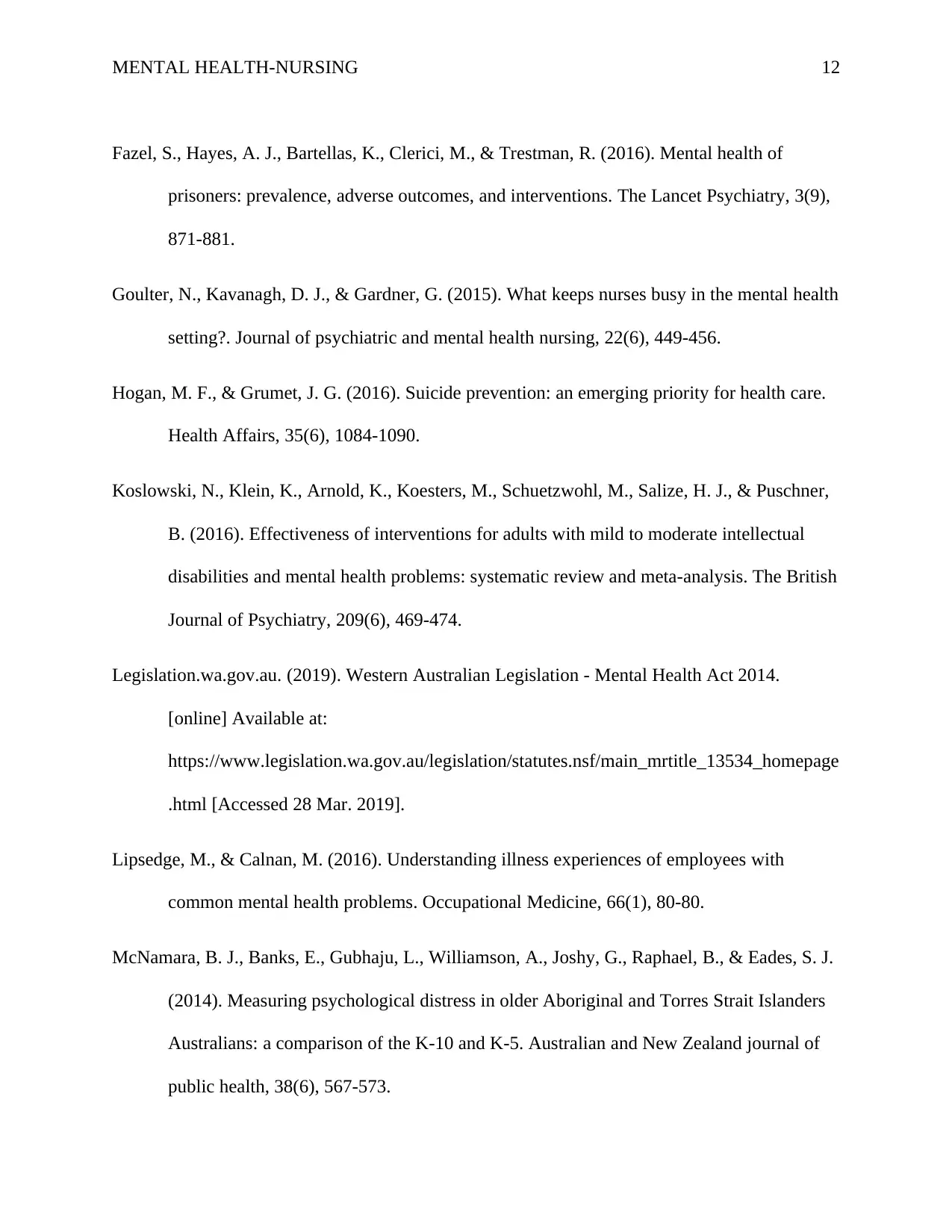
MENTAL HEALTH-NURSING 12
Fazel, S., Hayes, A. J., Bartellas, K., Clerici, M., & Trestman, R. (2016). Mental health of
prisoners: prevalence, adverse outcomes, and interventions. The Lancet Psychiatry, 3(9),
871-881.
Goulter, N., Kavanagh, D. J., & Gardner, G. (2015). What keeps nurses busy in the mental health
setting?. Journal of psychiatric and mental health nursing, 22(6), 449-456.
Hogan, M. F., & Grumet, J. G. (2016). Suicide prevention: an emerging priority for health care.
Health Affairs, 35(6), 1084-1090.
Koslowski, N., Klein, K., Arnold, K., Koesters, M., Schuetzwohl, M., Salize, H. J., & Puschner,
B. (2016). Effectiveness of interventions for adults with mild to moderate intellectual
disabilities and mental health problems: systematic review and meta-analysis. The British
Journal of Psychiatry, 209(6), 469-474.
Legislation.wa.gov.au. (2019). Western Australian Legislation - Mental Health Act 2014.
[online] Available at:
https://www.legislation.wa.gov.au/legislation/statutes.nsf/main_mrtitle_13534_homepage
.html [Accessed 28 Mar. 2019].
Lipsedge, M., & Calnan, M. (2016). Understanding illness experiences of employees with
common mental health problems. Occupational Medicine, 66(1), 80-80.
McNamara, B. J., Banks, E., Gubhaju, L., Williamson, A., Joshy, G., Raphael, B., & Eades, S. J.
(2014). Measuring psychological distress in older Aboriginal and Torres Strait Islanders
Australians: a comparison of the K‐10 and K‐5. Australian and New Zealand journal of
public health, 38(6), 567-573.
Fazel, S., Hayes, A. J., Bartellas, K., Clerici, M., & Trestman, R. (2016). Mental health of
prisoners: prevalence, adverse outcomes, and interventions. The Lancet Psychiatry, 3(9),
871-881.
Goulter, N., Kavanagh, D. J., & Gardner, G. (2015). What keeps nurses busy in the mental health
setting?. Journal of psychiatric and mental health nursing, 22(6), 449-456.
Hogan, M. F., & Grumet, J. G. (2016). Suicide prevention: an emerging priority for health care.
Health Affairs, 35(6), 1084-1090.
Koslowski, N., Klein, K., Arnold, K., Koesters, M., Schuetzwohl, M., Salize, H. J., & Puschner,
B. (2016). Effectiveness of interventions for adults with mild to moderate intellectual
disabilities and mental health problems: systematic review and meta-analysis. The British
Journal of Psychiatry, 209(6), 469-474.
Legislation.wa.gov.au. (2019). Western Australian Legislation - Mental Health Act 2014.
[online] Available at:
https://www.legislation.wa.gov.au/legislation/statutes.nsf/main_mrtitle_13534_homepage
.html [Accessed 28 Mar. 2019].
Lipsedge, M., & Calnan, M. (2016). Understanding illness experiences of employees with
common mental health problems. Occupational Medicine, 66(1), 80-80.
McNamara, B. J., Banks, E., Gubhaju, L., Williamson, A., Joshy, G., Raphael, B., & Eades, S. J.
(2014). Measuring psychological distress in older Aboriginal and Torres Strait Islanders
Australians: a comparison of the K‐10 and K‐5. Australian and New Zealand journal of
public health, 38(6), 567-573.
⊘ This is a preview!⊘
Do you want full access?
Subscribe today to unlock all pages.

Trusted by 1+ million students worldwide
1 out of 14
Related Documents
Your All-in-One AI-Powered Toolkit for Academic Success.
+13062052269
info@desklib.com
Available 24*7 on WhatsApp / Email
![[object Object]](/_next/static/media/star-bottom.7253800d.svg)
Unlock your academic potential
Copyright © 2020–2026 A2Z Services. All Rights Reserved. Developed and managed by ZUCOL.





